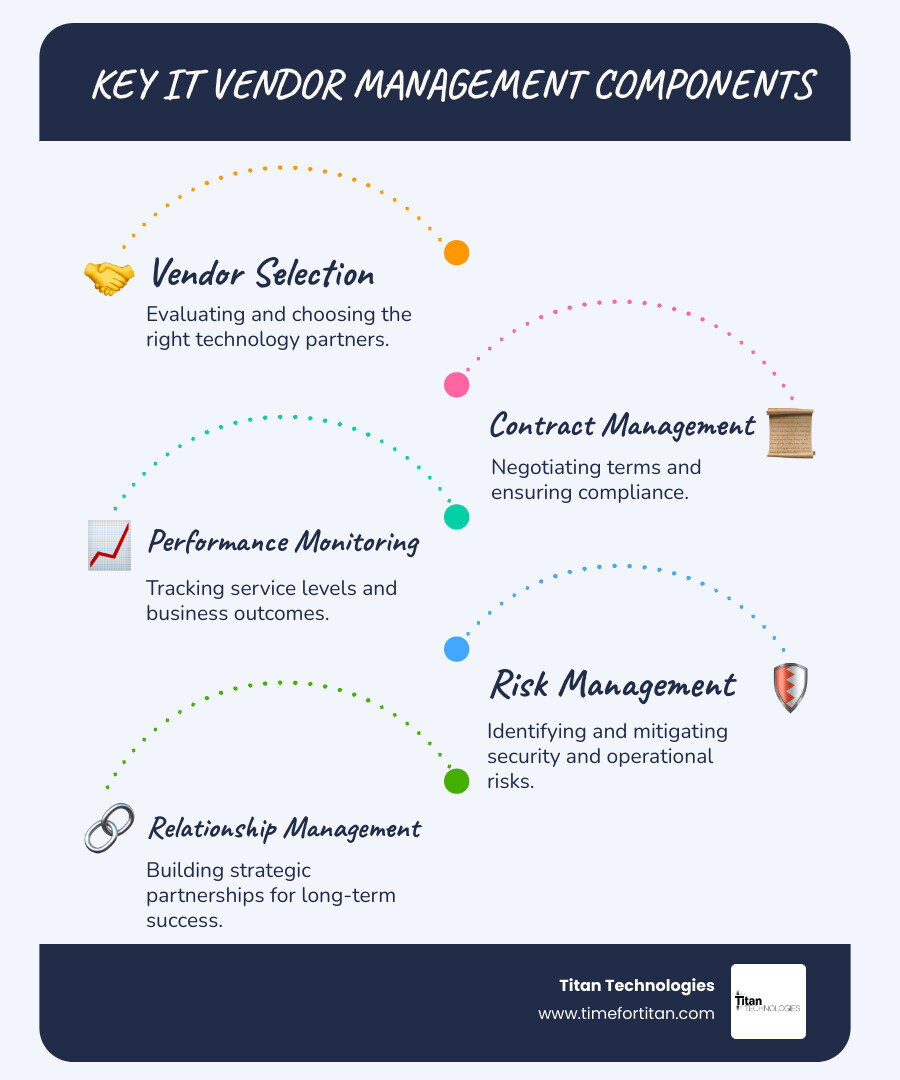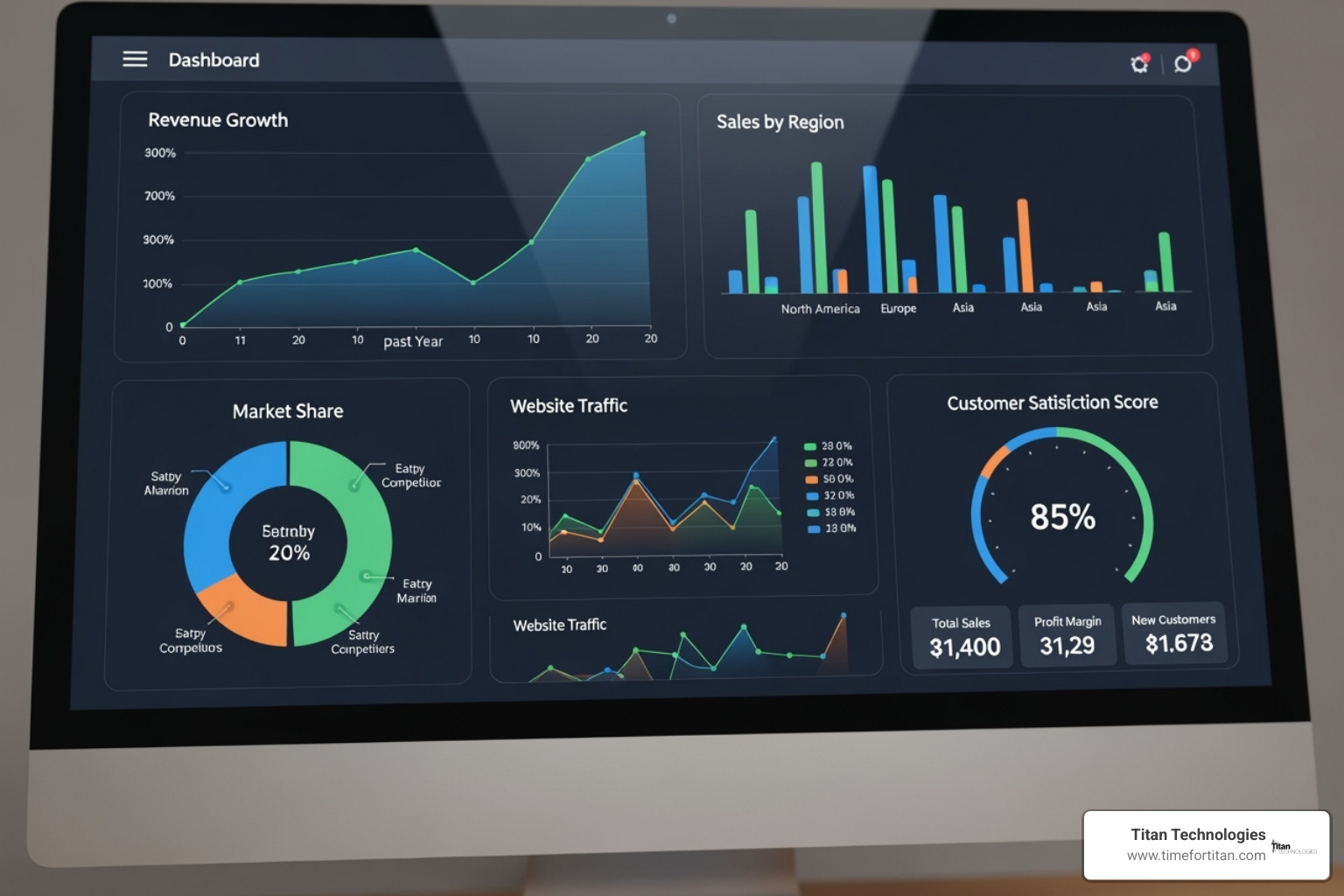Why IT Vendor Management is Critical for Modern Businesses
IT vendor management is the process of selecting, monitoring, and maintaining relationships with external technology providers to maximize value and minimize risk. For modern businesses, this transforms chaotic technology partnerships into streamlined operations that drive growth.
What IT Vendor Management Includes:
- Vendor Selection – Choosing the right technology partners.
- Contract Management – Negotiating terms and ensuring compliance.
- Performance Monitoring – Tracking service levels and outcomes.
- Risk Management – Mitigating security and operational risks.
- Relationship Management – Building long-term strategic partnerships.
The stakes are high. Research shows 84% of organizations experienced operational disruption from third-party incidents, and 66% faced adverse financial impact. Conversely, companies with structured vendor management programs achieve average cost savings of around 12%.
Businesses rely on external providers for everything from cloud services to cybersecurity. Without proper oversight, these relationships can lead to cost overruns, security vulnerabilities, and service failures. A structured approach to IT vendor management turns these challenges into competitive advantages, leading to improved service, reduced costs, and stronger security.
I’m Paul Nebb, founder of Titan Technologies. With over 15 years of experience helping Central New Jersey businesses, I’ve seen how proper IT vendor management transforms IT operations into strategic assets. This guide explores the strategies that turn vendor relationships into powerful growth drivers.

The Core Components of Effective IT Vendor Management
When your technology infrastructure depends on external suppliers, poor management can be devastating. A Gartner survey reveals the high cost of third-party risk incidents, showing 84% of organizations experienced operational disruption while 66% faced adverse financial impact. This makes IT vendor management the backbone of modern business operations.
Effective vendor management helps you select ideal suppliers, control costs, manage risk, and build stronger partnerships. Success requires clearly defined roles, even without dedicated positions. The Vendor Manager facilitates relationships and handles negotiations, while the Procurement Specialist manages the procurement process from sourcing to fulfillment.
Common challenges include a lack of visibility into third-party relationships, with 65% of procurement leaders having limited insight beyond their immediate suppliers. Another concern is increased regulatory scrutiny, as 60% of organizations worry about compliance. At Titan Technologies, we help businesses steer these challenges through our Managed IT Services in Princeton, NJ, ensuring vendor relationships are compliant and resilient.
Understanding the IT Vendor Management Lifecycle
Effective IT vendor management is a continuous journey, not a one-time task. Each phase builds on the last to create a strong, long-term partnership.
- Vendor Selection: Identify and evaluate potential partners who meet your IT needs.
- Contract Negotiation: Define terms, pricing, service level agreements (SLAs), and responsibilities.
- Onboarding: Integrate the new vendor into your operations, provide documentation, and set up communication.
- Performance Monitoring: Continuously track performance against KPIs and conduct regular reviews.
- Offboarding/Renewal: Plan for a smooth transition, whether renewing the contract or ending the partnership.
Critical Selection Criteria for IT Vendor Management
Choosing the right IT vendor requires a comprehensive evaluation beyond just the price tag.
- Technical Capabilities: Can they deliver the required services and innovate to support your growth?
- Financial Stability: Is the vendor financially healthy enough to be a reliable long-term partner?
- Security Posture: Do they have robust security protocols and certifications (e.g., SOC 2) to protect your data? Our Cyber Security Risk Assessment can identify gaps.
- Scalability: Can the vendor’s services grow with your business demands without a drop in quality?
- Cost vs. Value: Does the price reflect the true value, or are there hidden costs from poor service and security risks?
Onboarding and Offboarding Best Practices
A smooth start and a professional end to vendor relationships are critical for protecting your business.
Onboarding:
- Seamless Integration: Provide clear documentation on policies, standards, and requirements.
- Dedicated Contact: Assign a single point of contact to streamline communication.
- Access Control: Grant access only to necessary systems and data. Our Mobile Device Management Security (MDM) solutions can help enforce this.
Offboarding:
- Data Transfer Protocols: Securely handle or destroy any data held by the vendor.
- Asset Recovery: Ensure all company property and intellectual property are returned.
- Knowledge Transfer: Document processes to ensure a smooth transition to a new vendor or in-house team.
- Secure Credential Removal: Immediately revoke all vendor access to your systems.
Best Practices for Performance, Risk, and Compliance
Successful IT vendor management programs transform relationships from simple transactions into strategic partnerships that drive innovation and cost efficiency. This proactive approach catches issues before they become expensive problems. Our IT Consulting Services help Central New Jersey businesses implement these strategic frameworks.
Effectively Monitoring and Measuring Vendor Performance
You need clear, measurable ways to know if vendors are delivering on their promises.
- Key Performance Indicators (KPIs): Track metrics like SLA adherence, delivery timeliness, service quality, cost variance, and innovation contribution.
- Service Level Agreements (SLAs): Use clear, enforceable contracts that define service levels and penalties for non-compliance.
- Vendor Scorecards: Use quarterly scorecards to review performance with vendors, creating accountability and open dialogue.
- Regular Business Reviews: Schedule check-ins to discuss strategy, challenges, and opportunities.
- End-User Satisfaction: Gather feedback from internal teams to get a full picture of service quality.
This continuous monitoring aligns with our Proactive System Maintenance philosophy of preventing problems.
Managing Common Risks and Ensuring Cybersecurity
Smart IT vendor management turns potential vulnerabilities into manageable challenges.
Common risks include operational disruptions, financial instability in vendors, compliance failures, and data breaches, which cost companies an average of $4.45 million.
Our risk mitigation strategy includes:
- Thorough Due Diligence: We conduct extensive background checks, financial assessments, and Cybersecurity evaluations before engagement.
- Contractual Safeguards: Contracts must specify liability, data protection requirements, and performance penalties.
- Continuous Monitoring: Regularly assess vendors’ financial health, security posture, and compliance.
- Incident Response Planning: Have clear plans for vendor-related breaches or outages to minimize damage.
- Regular Audits: For high-risk vendors, periodic audits ensure ongoing adherence to standards.
Best Practices for IT Vendor Management Contracts
A well-written contract is the foundation of a successful partnership, setting clear expectations and protecting your interests.
- Clear Deliverables: Specify exactly what services or products the vendor will provide.
- Performance Metrics: Embed detailed SLAs with clear penalties for non-performance.
- Compliance Clauses: State all relevant requirements (e.g., GDPR, HIPAA) and include audit rights. This is vital for businesses needing Regulatory Compliance for CPAs.
- Data Protection Provisions: Detail how your data will be handled, stored, protected, and destroyed.
- Exit Strategy: Include provisions for a smooth transition, covering data migration, knowledge transfer, and asset recovery.
- Renewal Terms: Clearly define notice periods and price adjustment mechanisms.
Leveraging Technology and Automation
Managing IT vendors with spreadsheets and emails is inefficient and risky. Automating IT vendor management is a fundamental operational improvement that moves you from a fragmented, reactive approach to a centralized, proactive one. Modern systems provide instant visibility and automated workflows, freeing your team to focus on strategy. This shift is improved by modern infrastructure like our Cloud Computing Services NJ, which provide a secure and scalable foundation.
| Feature | Manual IT Vendor Management | Automated IT Vendor Management (VMS) |
|---|---|---|
| Data Storage | Dispersed in spreadsheets, emails, shared drives | Centralized, secure database |
| Workflow | Ad-hoc, manual, slow | Automated, consistent, fast |
| Visibility | Limited, siloed, outdated | Real-time, comprehensive |
| Reporting | Manual, time-consuming, error-prone | Automated, accurate, on-demand |
| Risk Monitoring | Reactive, difficult | Proactive, continuous, automated alerts |
| Compliance | Labor-intensive, inconsistent | Automated tracking, audit trails |
| Cost Control | Difficult to track, missed savings | Granular analysis, identifies savings |
| Onboarding Time | Weeks or months | Days or hours (up to 70-80% faster) |
How a Vendor Management System (VMS) Benefits IT Departments
A Vendor Management System (VMS) acts as a command center for all vendor relationships, providing significant benefits:
- Centralized Vendor Database: All vendor information, from contacts to contracts and performance history, is in one accessible place.
- Automated Workflows: Streamline time-consuming processes like onboarding, contract renewals, and performance reviews.
- Performance Tracking: Gain data-driven insights into vendor performance against SLAs, enabling fact-based discussions.
- Proactive Risk Monitoring: The system continuously monitors for changes in vendor risk profiles and sends alerts before issues impact your business.
- Reporting and Analytics: Make data-driven decisions by spotting spending trends, identifying top-performing vendors, and optimizing value.
- Automated Compliance Management: Track vendor certifications and adherence to policies, simplifying audit preparation.
Key Features to Look for in an IT VMS
When evaluating an IT VMS, look for features that transform your processes:
- Dashboard and Reporting: An intuitive interface providing at-a-glance views of KPIs, contract dates, and risk alerts.
- Contract Lifecycle Management: Manages contracts from creation to renewal with automated alerts and version control.
- Customizable Performance Scorecards: Adaptable scorecards to track relevant metrics for different vendor types.
- Risk Assessment Tools: Integrated tools for initial assessments and ongoing risk scoring.
- Vendor Portal: A self-service portal for vendors to update information and communicate, reducing administrative work.
- Integration Capabilities: Seamless integration with your existing ERP, financial, and IT asset management systems for comprehensive visibility.
Choosing the right VMS transforms IT vendor management into a strategic advantage that drives efficiency and reduces risk.
Frequently Asked Questions about IT Vendor Management
Here are answers to common questions about IT vendor management, based on our experience helping Central New Jersey businesses.
What is the difference between IT vendor management and IT supplier relationship management?
While often used interchangeably, they have different focuses:
- Vendor Management (VM) has a transactional focus. It’s about managing contracts, ensuring vendors meet performance targets, and controlling costs. It’s the foundation for a smooth operation.
- Supplier Relationship Management (SRM) has a strategic focus. It’s about building long-term partnerships to drive innovation, share roadmaps, and create mutual value beyond the contract.
You need solid vendor management before you can build strategic relationships.
How does IT vendor management contribute to cost savings?
A systematic approach to IT vendor management delivers substantial savings by:
- Negotiating better contracts: Data-driven negotiations can lead to average cost savings of 12%.
- Reducing redundant software: Eliminate overlapping services and unused software, which can cost the average business $135,000 annually.
- Optimizing license usage: Track software use to right-size licenses and avoid paying for empty seats.
- Preventing cost overruns: Proactive monitoring catches unexpected fees before they become major issues.
- Improving efficiency: Automating processes like onboarding can cut time by 70-80%, freeing up your team for strategic work.
How can IT vendor management support data privacy efforts?
Your cybersecurity is only as strong as your weakest vendor. Strong vendor management is critical for data privacy.
- Vetting vendor security: We thoroughly vet vendor security protocols, certifications, and incident response plans before engagement.
- Enforcing data protection in contracts: Contracts must clearly define how your data is handled, stored, and protected.
- Monitoring for compliance: We continuously monitor vendor compliance with regulations like GDPR and HIPAA to avoid penalties.
- Managing access controls: We ensure vendors have least-privilege access, which is reviewed regularly and revoked when a contract ends.
Strong IT vendor management acts as a security buffer, protecting your sensitive information. Our Data Protection and Management services ensure every vendor relationship includes the necessary security oversight.
Partner with the Experts to Streamline Your Vendor Relationships
Effective IT vendor management is a business necessity. Strategically managing your external technology partners is critical for success. This guide has shown how a proactive strategy reduces risk and improves value through better contracts, security assessments, and optimized resources. Companies with structured programs see average cost savings of 12%, avoiding the disruptions and losses that come with poor oversight.
At Titan Technologies, we have over 15 years of experience helping businesses in Central New Jersey turn vendor management challenges into strategic advantages. Our expertise in managed IT services and cybersecurity provides a unique perspective, allowing us to implement battle-tested strategies that deliver real-world results.
We’ve helped organizations in Edison, Elizabeth, Lakewood, Newark, Trenton, Princeton, New Brunswick, Matawan, Woodbridge, Freehold, and Red Bank transform their vendor relationships. Our clients see how proper IT vendor management creates operational efficiency and peace of mind.
We offer fast, reliable support with a 100% satisfaction guarantee. Our comprehensive approach ensures your network is efficient and secure, extending that protection to every vendor relationship. Don’t let scattered vendor management hold your business back. The strategies we’ve discussed can turn your IT partnerships into powerful growth engines.
Ready to take control of your vendor relationships? Get expert help with your IT strategy and let us show you how effective IT vendor management can become one of your greatest competitive advantages.
Note to self: Create all WordPress articles in draft mode.








